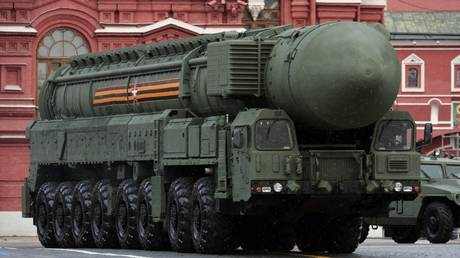ARTICLE AD BOX
IRAN has vowed to unleash a weapon “never used before” against Israel should their enemy strike back in retaliation for Tehran’s failed missile and drone blitz.
Israel has now confirmed they will retaliate as the world waits with bated breath amid fears of an “uncontrollable war” breaking out across the Middle East.
 Rex
Rex The moment Iran began its 300-missile attack on Israel that threatened to drag the Middle East to the brink of war
The moment Iran began its 300-missile attack on Israel that threatened to drag the Middle East to the brink of war Reuters
Reuters
Last night, Iranian security chief Abolfazl Amouei stated that if Israel chooses to respond to Iran’s drone and missile strike then Tehran is “prepared to use a weapon that we have never used”.
Amouei also warned Israel to “act wisely” as it considered its next steps.
It is unclear what weapons he is referring to, but Colonel Hamish de-Bretton Gordon, a weapons and defence expert, said that they’re hinting at nuclear, biological and chemical warfare.
Yet, the retired army officer told The Sun: “It is unlikely that Iran has some new, wonderful weapon that nobody knows about that could really have an impact against Israel or the West.
“What I take from this is further bluster from Iran. They’re obviously desperately concerned that the Israelis are going to hit them back hard.”
On Saturday night, Iran attacked Israel with a wave of at least 330 ballistic and cruise missiles and drones – the first ever direct attack by Tehran on its enemy.
Iran had promised retaliation for a deadly strike on its consulate building in Damascus earlier this month, but its barrage failed to get through Israel’s defences.
Israel Iron Dome defence system and its allies warplanes – including the UK’s RAF Typhoons – shot down 99 per cent of the projectiles.
In response, Iran’s deputy foreign minister, Ali Bagheri, raged last night: “If the enemy makes another mistake…they should know they will not have 12 days and Iran’s response speed will be less than a few seconds”.
Iran also yesterday vowed to launch ten times the amount of missiles in a fresh strike against Israel if it unleashes a retaliatory hit.
An attack ten times the size would see over 3,300 weapons hurled at Israel, including more than 1,400 missiles.
The recent threats mark another escalation in the blazing power battle between the two foes that is threatening to spark an all-our war across the region.
But Israel appears undeterred as it confirmed again last night it will strike back.
De-Bretton Gordon argued that Iran’s warnings are a clear sign of Iran’s fear as the nefarious state will do all it can “to persuade Israel to do nothing and draw a line under it”.
“It’s clear that the Iranian air defence system is nowhere near capable of what Israel and her allies put together.
“Iran could take a heck of a thumping and it might well be that Israel decide to take out their nuclear capability as well.”
 Alamy
Alamy A drone is launched at Israel from an undisclosed area in Iran
A drone is launched at Israel from an undisclosed area in Iran
IRAN’S NUKE SITES
This is the fear of the UN’s nuclear watchdog chief who said yesterday he is “concerned” that Israel may target Iran’s nuclear sites.
Rafael Grossi, head of the International Atomic Energy Agency (IAEA) urged “extreme restraint” from Israel.
He revealed that Iran temporarily closed its nuclear facilities over “security considerations” in the wake of its missile and drone attack.
They reopened on Monday but inspectors were kept away “until we see that the situation is completely calm”.
Iran has long said its nuclear programme is peaceful but Western countries accuse Tehran of attempting to build nuclear bombs.
It comes as Israel Defence Forces (IDF) chief of staff, Lt Gen Herzi Halevi, said Israel will respond to Iran’s barrage – bolstering other Israeli leaders’ comments they launch a “significant response”.
“This launch of so many missiles, cruise missiles and drones into Israeli territory will be met with a response,” he said in the clearest confirmation that Israel was plotting a revenge strike.
Israeli PM Benjamin Netanyahu met with his war cabinet for a second time yesterday after already hinting that plans had been drawn up – without specifying their nature or scale.
But Israel states it reserves the right to strike Iran “at a manner and time” of its own choosing and told the UN that Iran has “crossed every red line” in its attack.
But the question on everyone’s lips is how will Israel choose to respond.
The Sun also told of the five major ways Israel may choose to respond – from fighter jet blitz on Tehran’s nuclear facilities to a submarine strike or large-scale cyberattacks.
WORLD’S RESPONSE
As Iran braces for Israel’s “significant” response, world leaders have pushed for calm to avoid further escalation.
PM Rishi Sunak hads demanded Israel show restraint in response to Iran’s onslaught, calling out Tehran for its “reckless and dangerous escalation” that is the work of a “despotic regime”.
A joint statement by the G7 also urged for caution, fearing an “uncontrollable” war in the region.
UK foreign minister David Cameron said this morning that Iran’s attack was significant and Israel has “every right to respond”.
While he urged caution to “avoid escalation”, he said Israel would “make their own decisions”.
The IDF announced on Sunday night they had approved “both offensive and defensive actions” – but did not reveal further detail.
UN Secretary General Antonio Guterres told an emergency Security Council meeting on Sunday: “The Middle East is on the brink.
“The people of the region are confronting a real danger of a devastating full-scale conflict. Now is the time to defuse and de-escalate.”
 PM Rishi Sunak blasted Iran’s attack as “reckless” and called for calm
PM Rishi Sunak blasted Iran’s attack as “reckless” and called for calm US president Joe Biden speaking with Netanyahu on Sunday over fears of a ‘catastrophic escalation’ in the Middle East
US president Joe Biden speaking with Netanyahu on Sunday over fears of a ‘catastrophic escalation’ in the Middle EastNuclear sites in Iran

IRAN, a formidable and dangerous world power, is home to a number of nuclear sites.
It is thought to have active nuclear sites, research reactors and uranium mines.
Arak plant – satellite pictures of this plant near the Iranian town of Arak surfaced over 20 years ago.
It contains a heavy-water reactor with plutonium that can be used for nuclear bombs.
Bushehr nuclear power station – this power plant is a combination of Russian and German engineering.
It’s nuclear reactor is operating at 100% power and the site is home to enriched uranium, used for nuclear bombs.
Gachin uranium mine – home to uranium ore concentrate, or yellowcake, which can be transformed into enriched uranium ready for nuke bomb assembling.
Isfahan conversion plant – yellowcake is converted here into three dangerous substances.
Hexafluoride gase used in the enrichment process, uranium oxide used to fuel reactors and metal used in the cores of nuclear bombs.
Natanz uranium enrichment plant – this is Iran’s largest enrichment base.
It’s made up of three underground buildings and is closely watched by the international community.
Parchin military site – south of Tehran, this site is focused on research and the production of ammo, rockets and explosives.
Concerns have been raised that it is also used as part of Iran’s nuclear weapon development.
Qom uranium enrichment plant – a heavily fortified and initially secret facility where Iran carries out uranium enrichment.
 Iran has a spate of dangerous nuclear sites – including power plants, uranium mines and research reactors (pictured: Isfahan power plant)
Iran has a spate of dangerous nuclear sites – including power plants, uranium mines and research reactors (pictured: Isfahan power plant)
.png)
 7 months ago
4
7 months ago
4








 English (US)
English (US)